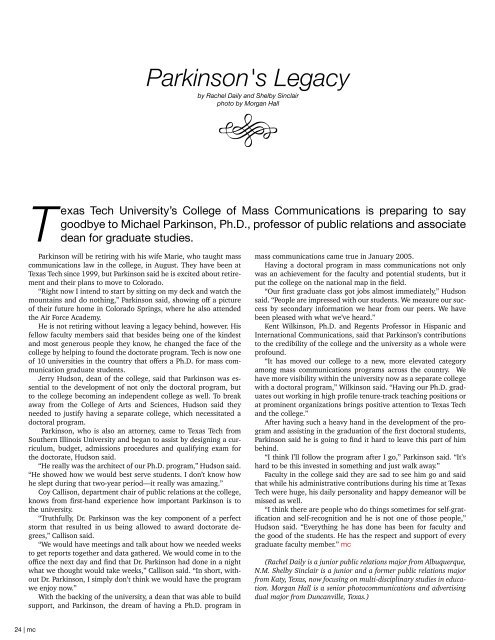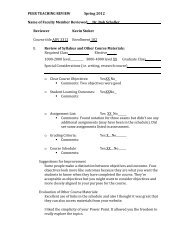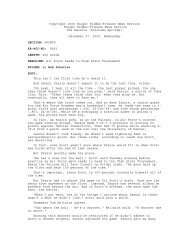Summer 2009 - Texas Tech University
Summer 2009 - Texas Tech University
Summer 2009 - Texas Tech University
Create successful ePaper yourself
Turn your PDF publications into a flip-book with our unique Google optimized e-Paper software.
Parkinson's Legacyby Rachel Daily and Shelby Sinclairphoto by Morgan Hall“He really was the architect ofour Ph.D. program. He showedhow we would best servestudents. I don’t know howhe slept during that two-yearperiod—it really was amazing.”—Dean Jerry C. Hudson<strong>Texas</strong> <strong>Tech</strong> <strong>University</strong>’s College of Mass Communications is preparing to saygoodbye to Michael Parkinson, Ph.D., professor of public relations and associatedean for graduate studies.Parkinson will be retiring with his wife Marie, who taught masscommunications law in the college, in August. They have been at<strong>Texas</strong> <strong>Tech</strong> since 1999, but Parkinson said he is excited about retirementand their plans to move to Colorado.“Right now I intend to start by sitting on my deck and watch themountains and do nothing,” Parkinson said, showing off a pictureof their future home in Colorado Springs, where he also attendedthe Air Force Academy.He is not retiring without leaving a legacy behind, however. Hisfellow faculty members said that besides being one of the kindestand most generous people they know, he changed the face of thecollege by helping to found the doctorate program. <strong>Tech</strong> is now oneof 10 universities in the country that offers a Ph.D. for mass communicationgraduate students.Jerry Hudson, dean of the college, said that Parkinson was essentialto the development of not only the doctoral program, butto the college becoming an independent college as well. To breakaway from the College of Arts and Sciences, Hudson said theyneeded to justify having a separate college, which necessitated adoctoral program.Parkinson, who is also an attorney, came to <strong>Texas</strong> <strong>Tech</strong> fromSouthern Illinois <strong>University</strong> and began to assist by designing a curriculum,budget, admissions procedures and qualifying exam forthe doctorate, Hudson said.“He really was the architect of our Ph.D. program,” Hudson said.“He showed how we would best serve students. I don’t know howhe slept during that two-year period—it really was amazing.”Coy Callison, department chair of public relations at the college,knows from first-hand experience how important Parkinson is tothe university.“Truthfully, Dr. Parkinson was the key component of a perfectstorm that resulted in us being allowed to award doctorate degrees,”Callison said.“We would have meetings and talk about how we needed weeksto get reports together and data gathered. We would come in to theoffice the next day and find that Dr. Parkinson had done in a nightwhat we thought would take weeks,” Callison said. “In short, withoutDr. Parkinson, I simply don’t think we would have the programwe enjoy now.”With the backing of the university, a dean that was able to buildsupport, and Parkinson, the dream of having a Ph.D. program inmass communications came true in January 2005.Having a doctoral program in mass communications not onlywas an achievement for the faculty and potential students, but itput the college on the national map in the field.“Our first graduate class got jobs almost immediately,” Hudsonsaid. “People are impressed with our students. We measure our successby secondary information we hear from our peers. We havebeen pleased with what we’ve heard.”Kent Wilkinson, Ph.D. and Regents Professor in Hispanic andInternational Communications, said that Parkinson’s contributionsto the credibility of the college and the university as a whole wereprofound.“It has moved our college to a new, more elevated categoryamong mass communications programs across the country. Wehave more visibility within the university now as a separate collegewith a doctoral program,” Wilkinson said. “Having our Ph.D. graduatesout working in high profile tenure-track teaching positions orat prominent organizations brings positive attention to <strong>Texas</strong> <strong>Tech</strong>and the college.”After having such a heavy hand in the development of the programand assisting in the graduation of the first doctoral students,Parkinson said he is going to find it hard to leave this part of himbehind.“I think I’ll follow the program after I go,” Parkinson said. “It’shard to be this invested in something and just walk away.”Faculty in the college said they are sad to see him go and saidthat while his administrative contributions during his time at <strong>Texas</strong><strong>Tech</strong> were huge, his daily personality and happy demeanor will bemissed as well.“I think there are people who do things sometimes for self-gratificationand self-recognition and he is not one of those people,”Hudson said. “Everything he has done has been for faculty andthe good of the students. He has the respect and support of everygraduate faculty member.” mc(Rachel Daily is a junior public relations major from Albuquerque,N.M. Shelby Sinclair is a junior and a former public relations majorfrom Katy, <strong>Texas</strong>, now focusing on multi-disciplinary studies in education.Morgan Hall is a senior photocommunications and advertisingdual major from Duncanville, <strong>Texas</strong>.)Michael Parkinson, Ph.D.24 | mc mc | 25




